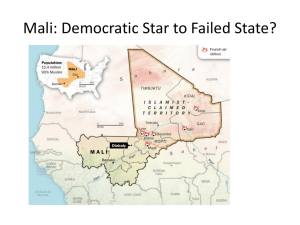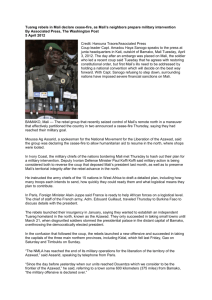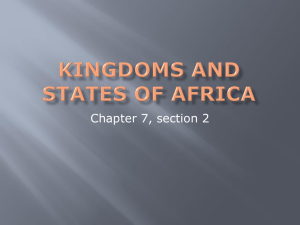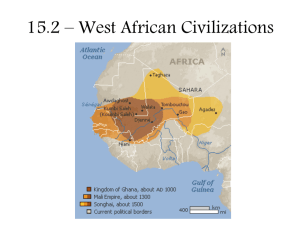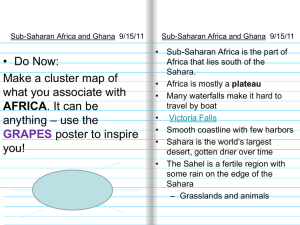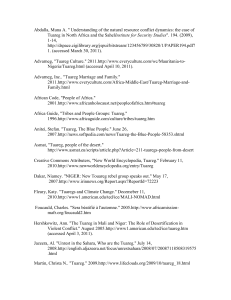When six fans of West African music, including Jimmy Buffett and
advertisement
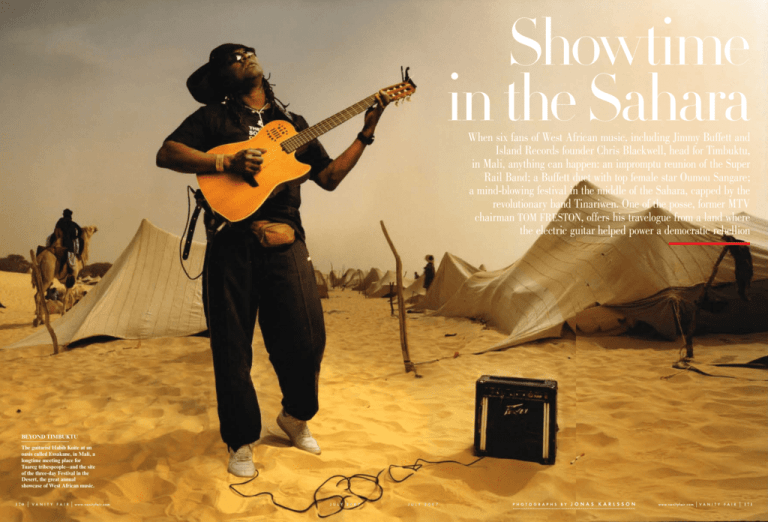
Showtime
in the Sahara
When six fans of West African music, including Jimmy Buffett and
Island Records founder Chris Blackwell, head for Timbuktu,
in Mali, anything can happen: an impromptu reunion of the Super
Rail Band; a Buffett duet with top female star Oumou Sangare;
a mind-blowing festival in the middle of the Sahara, capped by the
revolutionary band Tinariwen. One of the posse, former MTV
chairman TOM FRESTON, offers his travelogue from a land where
the electric guitar helped power a democratic rebellion
07
1
00
VA N I T Y FA
A II RR
www.vanityfair.com
www.vanityfair.com
c r e d it s h e r e
The guitarist Habib Koite at an
oasis called Essakane, in Mali, a
longtime meeting place for
Tuareg tribespeople—and the site
of the three-day Festival in the
Desert, the great annual
showcase of West African music.
july
2007
c r e d it s h e r e
BEYOND TIMBUKTU
july
2007
photographs
by
Jonas Karlsson
www.vanityfair.com
VA N I T Y
FA I R
171
T
DESERT BLUES
Monday
TO BAMAKO
(1) Face in the crowd: a man from the
Bella tribe at the festival. (2) A large portion
of the audience, mostly Tuareg tribespeople,
arrive at Essakane by camel. (3) The musician
Adama Yalomba, famous for his flips from a
standing position. (4) The main stage at the oasis.
(5) The musician Baba Salah in Bamako, Mali,
on the street where he lives.
he city of Dakar lies at the westernmost tip of Africa, on the
big continental bulge that juts
out to the left on the map. We
flew over it at night, on a flight
from the Cape Verde Islands.
The city was ablaze with lights,
and then—wham!—it was total
darkness out the window for
the next two hours, until we hit
Bamako, the capital of Mali,
and our destination.
We are six friends looking
to check out Mali’s renowned music scene. Over the years we’ve
all been captivated by West African music. We’ll be in Bamako a
few days, and then off to Timbuktu, in the North, and ultimately
beyond Timbuktu and into the Sahara for the Festival in the Desert. It’s often called the “world’s most remote music festival,” a
claim that should hold up.
Who’s “we”? We are: Chris Blackwell, a Jamaican and the founder
of Island Rec­ords (Bob Marley, U2, Cat Stevens, and many African
artists). Chris is traveling lighter than any man I’ve ever seen—flipflops, African-print cotton clothes, and what is basically a purse. He
The level of musicianship in Mali
is extraordinary. Music comes at you from every angle.
1
2
3
4
5
172
VAN I T Y
FA I R
www.vanityfair.com
july
2007
has no visas and seems to just talk his way into countries. There is
Jimmy Buffett, troubadour of the Caribbean, accomplished traveler,
and aficionado of all things tropical. He’s got a G.P.S. device, a bag
filled with walkie-talkies, and a guitar. There’s Kino Bachellier, from
the French West Indies, a doctor on St. Barth’s until he met Jimmy
there in the 1970s. That put an end to the doctoring. He has toured
with Jimmy now for almost 30 years. There’s Bill Flanagan, a writer,
novelist, editor, executive at MTV Networks, and commentator on
all things musical for CBS. You will not find a man more knowledgeable about popular music. And, finally, there is Jonathan Brandstein, from Los Angeles, an adventurous manager of comedians and
a world-music nut. He has been to Mali before.
Music is easily Mali’s most famous export. The level of musicianship here is extraordinary—there’s even a traditional musician
class known as griots. Throughout Africa, music holds this incredible power; in a place where life can be hard, it is one of the
greatest joys. A visitor quickly notices that music comes at you
www.vanityfair.com
VA N I T Y
FA I R
173
Youssou N’Dour,
photographed in
Dakar, Senegal.
Youssou N’Dour’s personal playlist
Youssou N’Dour, 47, a native of Senegal, shot
to world-music superstardom in the 1980s, boosted
by a soaring voice, a signature “Afro-pop” sound,
and a collaboration with Peter Gabriel.
For Vanity Fair, N’Dour compiled this guide
1. “Li Ma Weesu,”
by Yous sou N’Dour . This song
9.
is about the mirror of memory.
2 . “Senegal Fa st Food,” by
Amadou & Mariam . The “blind
couple of Mali” serves up a slice
of life in Dakar (Senegal’s capital),
where a certain frenetic street
energy can make New York or
Los Angeles seem sedate.
10. “Iniagige ,” by Salif
Keita . Through Salif, our epic
“Savane ,” by Ali Fark a
TourÉ . No one was more
11. “Miya abele ,” by Ba aba
Ma al . Graceful, pure, thoughtful,
identities breathe in all the world’s
capitals. Amul moroom: There
is no one like him.
3.
committed, learned—Baaba Maal
is a kind of glue for our diverse
musical cultures.
responsible than Ali Farka for making
clear the links between West African
roots music and its New World
progeny (blues, jazz, and rock).
“Jaman Moro,” by Afel
Bocoum . Nick Gold at World Circuit
12 .
“Jiin Ma Jiin Ma ,” by
Orchestr a Baobab. It
4.
Records has unveiled another genius
and a worthy heir to Ali Farka Touré.
represents the round-trip through
which Afro-Cuban music returned to
our shores. Orchestra Baobab
inspired me very much when I
was a teenager.
13. “Sigui,” by Djelimady
Tounk ar a . Comfort music: this
tranquil offering is a balm for my soul
from the guitarist of the original,
great Super Rail Band, of Bamako
(Mali’s capital).
“Africa Challenge ,” by
Toumani Diabate’s
Symmetric Orchestr a .
5.
14. “Debe ,” by Ali Fark a
TourÉ and toumani
diabate . Heavenly melodies
An African groove from this master
of the kora (the African harp)!
6. “Sa a Magni,” by Oumou
Sangare . The Malian queen of
played by divinely inspired hands.
Any commentary would be
superfluous.
the Wassoulou sound introduced a
strong woman’s social and political
perspective to our music.
“All ah,” by Yous sou
N’Dour . “He laid forgiveness onto
15.
7. “Chet Bogha s sa ,” by
Tinariwen . Africa has a knack for
coming up with things profoundly new.
What else to say about this marriage
of the electric guitar with the deep
desert by these Tuareg soul rebels?
“M’Bifo,” by Rokia
Tr aorÉ . Traoré gracefully
8.
transforms her modernist spirit and
ideals into a vehicle for hope,
connection, and community.
174
“Sou,” by Cheikh LÔ.
Mbalax’s gentlest poet spins another
winning moral tale from his Baye Fall
Sufi heart. He is representative of the
unique Senegalese religious ethos.
VAN I T Y
FA I R
your wrongs and covered you with
His favors.” Religion is not meant to be
sad, or morose. It is meant to be joyous,
and connected to human promise.
{
www.vanityfair.com
to learn how to
download F REE COPI ES
OF ALL THE S ONGS
o N N’DOU R’S P LAYLIS T,
go to VF.coM.
}
sitting in the sand,
jamming with electric guitars.
Leo Fender could never
have imagined this.
B
Tuesday
ON A ROLL
amako is low-rise and a bit gritty—nothing fancy here as, say, in Dakar. Many
streets are jammed with traffic. I see a lot
of vans and mini-buses with the doors
taken off. The women wear bright, wonderfully mismatched blouse, skirt, and
head-wrap combinations. The men wear
caps and caftan-like garments called boubous. Lots of T-shirts too. Nike’s “Just
Do It” seems to be a big seller. Every other person is on a cell
phone, or buying or selling one.
I wanted to see the famous railroad station, built by the French.
The hotel right next to it, the Buffet Hotel de la Gare, was the venue for the music scene that exploded in Mali after independence,
in 1960. The hotel had a bar and a club on an outdoor terrace.
There was a small stage, and back then lanterns were hung across
the dance floor. The Buffet Hotel de la Gare was the Malian version of Max’s Kansas City.
In the 70s, Mali’s government, like many others in Africa,
funded large bands to express the culture and vitality of the new
nation. The Super Rail Band, which played at the Buffet Hotel,
was one of them. It became the hottest group in the country—
Mali’s Beatles. Some of its members, such as Salif Keita and Mory
Kanté, went on to African superstardom and international fame.
The Super Rail Band created a new sound, mixing Afro-Cuban
dance rhythms and varieties of traditional Malian music. It was
wildly infectious.
Today, it’s obvious that the good times have moved on. The
place is in serious disrepair. But as we stand outside, imagining what had been, a man approaches us, curious. He is an older
fellow, and through him we meet an actual member of the Super
Rail Band. We propose a “reunion show” for that night. He says
it is possible, and we negotiate a fee and ask him to bring an audience too. We set the show for nine p.m.
On a roll, we decide to try to contact Toumani Diabate, an international star who, at 41, is widely regarded as the world’s top
kora player. (A kora is a 21-string harp-like instrument that creates a defining African sound.) He was once on Chris’s label, and
we had heard that he was back in Bamako. Incredibly, he, too, is
available, and agrees to play for us with his big-band ensemble,
the Symmetric Orchestra. We settle on a continued on page 2 2 0
jULY
2007
THE WANDERER
A Tuareg tribesman who
traveled two weeks by
camel across the Sahara for
the three days of music
at Essakane.
c r e d it s h e r e
Echoes of Africa
You see
turbaned Tuareg
from every angle, like some exotic mix tape. Mali and Senegal are
perhaps the two leading places to go for West African music, but it
comes in many variations. The good news is that they’re all good.
There is the hypnotic “desert blues” sound from the North, exem­
plified best by Ali Farka Touré, who died last year. There are the
more danceable and rhythmic sounds of the South: Salif Keita
and Amadou & Mariam are names you might recognize. You’ve
heard this music. Snatches of it are in movie sound­tracks and TV
commercials. Western artists such as Taj Mahal and Ry Cooder
and Robert Plant have done collaborations with African artists
that have sold well.
Our plan is pretty loose; nothing is real­ly set. We clear immigration and customs (Chris gets a visa), and head off to town. It’s
10 p.m. The streets are quiet, and everything seems engulfed in
smoke. We cross a long bridge over the Niger River and roll up to
our hotel, the Kempinski El Farouk. It’s right on the river and, as
it should in a former French colony, has a decent wine list.
july
2007
www.vanityfair.com
VA N I T Y
FA I R
175
a public meeting on land mines,” says Lord
Deedes, “and she really knew what she was
doing. She wasn’t just a royal observer.”
S
he wasn’t just a royal anything. That was
the beauty of it. Had she lived, losing her
H.R.H. might have turned out to be the best
thing that had ever happened to her, just as
her mother had said. Yes, she was losing
most of the perks and protections of the royal cocoon. But the power of her magic touch
with the media and the public was some-
Desert Music Festival
price, a place
(the Hogon Club), and a time (11 p.m.).
Word would go out, and the club would be
filled. We were now two for two.
Then, to top it off, Jonathan gets a call
from Oumou Sangare, Mali’s most popular female singer and its greatest champion
of women’s rights—a true diva. Oumou has
played Carnegie Hall. As is common here in
West Africa, she also runs her own club and
hotel, the Hotel Wassoulou. She would “love
to see us” later tonight, she says.
contin u e d f ro m pa g e 0 0 0
A
t nine p.m. we arrive at the Rail Station.
No sign of a band, but an audience
has begun to build. To placate the crowd,
Jimmy takes out his guitar and does a short
acoustic set in the bar. Buffett at the Buffet.
Meanwhile, the Rail Band does arrive, sets
up, plugs in, and begins to play on the stage
outside. There are eight players, including
three front men. Some are in boubous, others in Western clothes. It’s dark, and there
are no lights. Jonathan gets a taxi to come
into the courtyard, and the band plays to
the headlights. Jimmy has the driver put on
the blinkers too. “More disco-like,” he says.
They play a spirited set for two hours.
Then we duck out for the second show, at the
open-air Hogon Club. Toumani (in a black Tshirt) and the maître d’ (in a tuxedo) meet us
outside. “Hey, man, where’s Chris?,” Toumani
asks in an English accent. He is a handsome
man, the latest in a line of 70 generations of
kora players, and a real virtuoso. The Symmetric Orchestra is ready to go. Toumani sits
in the center. There are two electric guitars,
July
20 0 7
thing no one could take from her. And what
she was gaining was freedom—the freedom
to act without the constraints and limitations
of palace and political bureaucrats, the freedom to embrace causes of her own choosing
regardless of their potential for controversy,
the freedom to make a difference on things
that mattered and to see results.
In Ottawa, Canada, not long after her walk
through the minefields, 122 governments
agreed on a treaty banning the use of antipersonnel land mines. The Nobel committee
awarded the campaign the Nobel Peace Prize,
coupled with the name of the leading American campaigner, Jody Williams. In the House
of Commons, during the second reading of the
Landmines Bill, in 1998, the British foreign
secretary, Robin Cook, paid handsome tribute
to Diana, Princess of Wales, for her “immense
contribution to bringing home to many of our
constituents the human costs of land mines.”
Diana was not there to hear it. She was
alone on an island, in her grave at Althorp,
the Spencer-family estate. �
a bass, drums, keyboards, a xylophone-like
bafolon, and a wide assortment of percussion
instruments. When they kick it off, it’s like being shot from a gun.
Unfortunately, we have to sneak out again.
It’s 2:30 a.m. when we arrive at the Hotel Wassoulou, where Oumou Sangare is singing. Oumou came on the music scene back in 1990, at
age 21. She hit it big from the start, owing both
to her vocal skills and to her ability to generate
controversy with lyrics that condemned polygamy and arranged marriages, and pushed for
women’s rights. She was the first of a kind in
Mali. Tonight, to a packed house and with a
killer band, she roves singing among the audience and then implores Jimmy to join her on
guitar. A brave man, he takes the stage, and
together they knock out a rousing version of
Bo Diddley’s “Who Do You Love?”
It’s well after four a.m. when we stumble
back to the El Farouk. Chris tells me it’s “the
best single night of music” he’s ever had—this
from the man who gave us Steve Winwood,
Bob Marley, and U2.
Since then it’s been mostly quiet on the
northern front. Today, Mali is a functioning Muslim democracy. On some levels, it is
a study in success. The country is tolerant,
diverse, optimistic, and stable. But it’s also,
and very obviously, one of the world’s poorest countries.
From the air Timbuktu looks like a sandcastle village of little brown squares. It’s a
grid, dusty brown, and it morphs into the
surrounding desert. There’s a new, empty
airport terminal, but not another plane in
sight. Here the city is spelled “Tomboucktou,” which I file away, thinking it might be
a good way to introduce myself to people
here when the situation merits. Three young
Americans, all with military buzz cuts and
identical wraparound shades, meet us. Turns
out they are looking for Jimmy Buffett. Parrotheads in the Sahara. They tell us they are
with “the D.O.D.” I was unsure what that
was, and they clarified (“Department of Defense”). We’ll run into them again, but never
quite figure out why they’re here. Outside, in
the streets of Timbuktu, sand blows continually. My companions and the few other Westerners I see have largely switched to Tuareg
turban-like headgear. (I just can’t.) We are
here for a dose of Tuareg music—that “desert blues” sound—but this afternoon all the
shops are blasting out 50 Cent on the radio.
I turn on the small black-and-white television
in my hotel and see Sigourney Weaver in an
Arabic-dubbed version of Alien.
Wednesday
THE NORTHERN FRONT
Timbuktu is a place I have always wanted
to see. Once, in the early 1970s, I was in the
Sahara in southern Morocco and saw a sign:
timbuktu—45 days. That was for camel caravans, which ply the Sahara even now. Eons
ago the big export from Timbuktu was salt,
and the caravans made Timbuktu a wealthy
city. In the 1500s it was home to a university
and famous mosques.
Timbuktu used to sit on the edge of the desert. Today, with desertification, the sands have
passed it by on their journey south. The city is
inhabited largely by Tuareg, who are nomadic, very independent, and ethnically different
from those who live in southern Mali. There
are people in Timbuktu from the Fula and
Songhai tribes as well. The Tuareg have risen
up regularly—against the French in colonial
times and against the Malian government today. There was a bloody rebellion more than a
decade ago, with a lot of fighting in Timbuktu
itself. It ended in 1996, with promises of better representation for the Tuareg in the government, and more freedom of movement.
Thursday to Saturday
MIDNIGHT AT THE OASIS
The Festival in the Desert takes place some
70 kilometers to the northwest of Timbuktu.
We have a breakfast of bread, water, and
Jamaican Blue Mountain Coffee (Chris’s
stash). Afterward we drive into the desert in
three S.U.V.’s in tight formation. There are
no roads, just endless braids of tracks in the
sand. The ride shakes us to the bone.
After four hours of this we realize we are
lost, which is a bit of a disappointment. The
guide from Timbuktu has failed. His head
hangs down. A nomad materializes, and we
ask him, in effect, “Hey, have you seen a festival around here?” And he answers, in effect,
www.vanityfair.com
VANIT Y
FAIR
213
Desert Music Festival
“Why are you paying this idiot? You should
pay me.” We did. He hopped on the running
board and got us to the festival an hour later.
The festival is at an oasis called Essakane.
Clean white sand dunes, a few trees, camels
everywhere. Essakane has been a meeting
spot for Tuareg tribespeople for many years.
The festival, which began in 2001, has been
held here for the last five years. It is largely a
Tuareg event, and it must be the only festival
where a large part of the audience arrives in
camel caravans. They come from all over the
Sahara, some traveling for weeks.
Tents of many kinds and sizes undulate
across the dunes. I observe a makeshift “Bar
& Restaurant” and, three dunes away, a concrete stage built into the sand. Here and there
you see turbaned Tuareg sitting in the sand,
jamming with electric guitars, putting out a
raw, bluesy sound through small, battery-powered amplifiers. For security, there’s a jeep
with a mounted 50-mm. machine gun nearby.
Leo Fender could never have imagined this.
There are 45 acts at the festival, representing music from all parts of Mali as well
as from neighboring countries. We run into
Manny Ansar, the festival organizer and a
Tuareg himself, dressed elegantly in a boubou, a turban, and shades. The festival is his
baby, but it actually represents his second
(and nonpaying) job. In his other life he’s in
charge of “human resources” for an electrical
company in Bamako. Manny congratulates
us on our bravery for defying the recent U.S.
State Department travel advisory warning
U.S. citizens to stay away from the festival.
Needless to say, we know nothing about this.
The advisory cites “banditry, factional rivalry, and car jackings” in this “lawless area.” It
sounds more like L.A. If you paid attention
to all the State Department advisories these
days, you’d end up going almost nowhere.
Congo Pilots
rea
p
s
i
min
tk
d
e
h
dw
for down-andlocked on the cockpit display; upon touchdown the airplane had gone crooked careened off the runway. This is nothing
contin u e d f ro m pa g e 1 6 7
214
VAN I T Y
FA I R
www.vanityfair.com
Our tents are simple—a patchwork of animal skins tied to wooden poles and trimmed
with decorative tassels, but with no door or
flap. I went to sleep one night as a sandstorm
raged outside, and awakened to find a foot of
sand inside my tent. (Jimmy told me later that
he had to zip himself tight into his sleeping
bag and breathe through a rolled-up magazine
he stuck through a small opening.) My neighbors are “the Libyan Delegation.” As Bill and
I head to a dining area, we see a group of four
men behind my tent holding down goats and
slaughtering them one by one. After dinner
we hike over the dunes to the stage. It’s dark
now. Campfires burn everywhere, and camels
stand in silhouette atop distant dunes.
The first group we see after coming all this
way is … a bunch of Americans! They call
themselves the Pangea Proj­ect, after the hy­po­
thetical landmass that the world’s seven continents once formed. All students of West African
music, the members of the Pangea Proj­ect are
actually quite good. They turn in an energetic
set and gradually win over the locals. Next up
is Adam Yalomba. A happy man in a shiny
Western suit, he sings lead vocals and plays
an electric kora in front of a big band. The
audience is on its feet for him. At one point he
drops his kora, performs some ­Motown-style
dance steps, then does a full-front flip from a
standing position—a real showstopper.
T
he festival goes on for two more days.
The highlights include a tribute to Ali
Farka Toure, Mali’s biggest star ever, featuring an impressive list of artists, Oumou Sangare and Toumani Diabate among them. An
electric-guitarist from Bamako, Baba Salah,
who is called “the Jimi Hendrix of Africa,”
blows the house down. The festival closes
with a rousing set from the group Tinariwen.
Tinariwen is the stuff of legend in these
parts. It is basically a rock band—six electric
guitars, three female singers, and a percussionist—with a rebellious political flavor. The
against the design of the airplane or the
maintenance that had been done: Fousseyni
believed that the old machine had finally just
decided to give up.
H
e led me back to the latest willing beast,
past the cassava leaves in the cargo
hold, and into the cockpit for the engine
start—delayed for a moment by a door-ajar
light. His co-pilot was an affable middle-aged
Congolese named Albert Ependa, the son of
an ambassador to Spain, Great Britain, and
Morocco, whose early enthusiasm for this
career had been dampened by three serious
accidents, and who as a result had slowed
down and had only recently begun to train
for an airline-transport pilot license (U.S.),
hardly more than a store-bought ticket but
classic Tinariwen image: turbaned soldiermusicians on camels with Kalashnikovs and
Stratocaster guitars crossed over their shoulders. Their story says much about the power
of music in Africa, and about the recent
positive turn of events in Mali.
Tinariwen was formed in 1982 after a
young man named Ibrahim Ag Alhabibe
abruptly fled the country. Years before, his
father had died at the hands of Malian soldiers; now, after a period of nomadic wandering throughout the Sahara, he was lured with
two friends to southern Libya, where Colonel
Muammar Qaddafi had established military
training camps to help the nationless Tuareg.
There he discovered not only a refuge but
also—who would have guessed?—electric guitars! The young men practice, they write songs
about revolution and freedom, and they marry
these lyrics to a new electric sound. On top of
that, these young Muslims create a band that
has (gasp) women in it. Then, in this land of
no media, no Internet, the music of Tinariwen
travels all over the Sahara by cassette and inspires an entire generation of young people.
The music is officially banned in Algeria and
Mali, which only adds to its allure.
In the 1990s, Tinariwen joins with the
Tuareg rebellion. It’s as if the Rolling Stones
went off to war. Ibrahim, the leader, becomes
an obvious target. He is shot and wounded 17
times—twice as many times as our own 50
Cent, and surely a rec­ord for gunshot wounds
by any living musician anywhere. Peace
comes. The band moves back to Mali, signs
an international rec­ord deal, gets down to
business, and becomes even more popular.
Tinariwen’s story parallels Mali’s more
hopeful scenario. Swords turn to guitars,
democracy blooms, and music helps bring a
sense of national unity. I’m not sure I ever understood what those American soldiers were
doing in Mali’s desert. But I do know that the
American invasion that really made a difference here was one of electric guitars. �
a requirement for command. He later told
me he earns $2,000 a month, three-fourths
of which he sends to his wife and three children, who live in Montreal; the company
provides him with a car, and pays the fare to
Canada when he breaks to see his family. He
was competent in the cockpit, though placid,
as co-pilots learn to be; he read a checklist to
Fousseyni as we back-taxied on the runway,
wallowing through the holes. I sat in a jump
seat behind the two men, as I had flying in.
Fousseyni pivoted the airplane tightly, lined
it up, and immediately brought the engines
to full takeoff power. The airplane shook
and trembled as he held it there, checking
for signs of trouble. He released the brakes,
and we rolled, wallowing again, then slamming down the left side of the runway, pickJ ULY
2007


